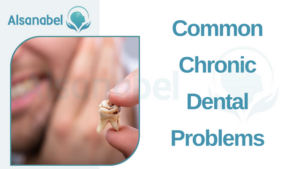chronic dental problems
Chronic dental problems are persistent oral health conditions that can affect the teeth, gums, and overall oral-facial system. Cavities, also known as tooth decay, occur when bacteria in the mouth produce acids that erode the tooth enamel, leading to the formation of holes or cavities.
Tooth erosion, on the other hand, is the gradual loss of tooth structure caused by acid erosion from sources such as acidic foods and beverages or gastric reflux. Gum infections and gum diseases, such as gingivitis and periodontitis, result from the buildup of plaque and bacteria along the gumline, leading to inflammation, bleeding, and potential tooth loss.
Common Chronic Dental Problems

Tooth decay and cavities
Tooth decay and cavities are among the most common chronic dental problems worldwide, affecting people of all ages. Tooth decay occurs when bacteria in the mouth produce acids that erode the tooth enamel, leading to the formation of small holes or cavities. These cavities can occur on the surface of the teeth or within the deeper layers. If left untreated, they can become larger and affect the underlying structures, causing severe toothaches, infections, and even tooth loss.
The main cause of tooth decay is poor oral hygiene, which allows bacteria to thrive and produce acids that attack the teeth. Additionally, consuming sugary foods and beverages and frequent snacking can increase the risk of developing cavities. It is important to note that even infants and young children can get cavities, so proper oral care should start from an early age.
Gum disease and periodontitis
Gum disease, also known as periodontal disease, is another common chronic dental problem that affects the gums and the bone supporting the teeth. It is characterized by inflammation and infection of the gums, which can lead to gum recession, bleeding, and eventual tooth loss if not treated.
Gum disease typically starts with gingivitis, which is the early stage characterized by red, swollen, and bleeding gums. If left untreated, it can progress to periodontitis, a more advanced stage where the infection spreads to the supporting bone and connective tissues. Periodontitis can weaken the bone, causing teeth to become loose and possibly fall out.
Causes of Chronic Dental Problems
Poor oral hygiene
One of the primary causes of chronic dental problems, such as tooth decay and gum disease, is poor oral hygiene. Failing to brush and floss regularly allows bacteria to build up in the mouth, leading to plaque formation. Plaque is a sticky film that adheres to the teeth and gums and contains harmful bacteria. If not removed through proper oral hygiene practices, plaque can cause tooth decay and gum disease.
Unhealthy diet and nutrition
Another significant cause of chronic dental problems is an unhealthy diet and poor nutrition. Consuming sugary foods and beverages, such as soda, candy, and pastries, increases the risk of developing cavities. When these sugary substances come into contact with the bacteria in the mouth, they produce acid that erodes the tooth enamel, leading to decay.
Additionally, a diet lacking in essential nutrients, such as calcium and vitamin D, can weaken the teeth and gums, making them more susceptible to dental problems. Without proper nutrition, the body’s ability to fight infections and maintain healthy teeth and gums is compromised.
Furthermore, certain eating habits, such as frequent snacking between meals or sipping on sugary drinks throughout the day, prolong exposure to acids and sugars, increasing the risk of dental problems.
To prevent chronic dental problems related to poor diet and nutrition, it is essential to maintain a balanced diet that includes fruits, vegetables, whole grains, lean proteins, and dairy products. Limiting the consumption of sugary foods and drinks, and practicing good oral hygiene, can help protect the teeth and gums from decay and disease.
By addressing these causes, individuals can take proactive measures to prevent chronic dental problems. Regular brushing and flossing, along with a healthy diet and regular dental check-ups, are vital for maintaining optimal oral health and preventing long-term complications.
Signs and Symptoms

Tooth Sensitivity
One of the common signs of chronic dental problems is tooth sensitivity. This condition occurs when the protective layer of enamel on the teeth wears down, exposing the sensitive dentin underneath. Individuals with tooth sensitivity often experience discomfort or pain when consuming hot or cold foods and beverages, as well as when brushing or flossing their teeth. The sensitivity can range from mild to severe and may affect one or multiple teeth.
Tooth sensitivity can be caused by various factors, including tooth decay, gum recession, teeth grinding or clenching (bruxism), worn dental fillings, or cracked or fractured teeth. It is important to address tooth sensitivity promptly as it can indicate an underlying dental problem that requires treatment.
Persistent Bad Breath
Persistent bad breath, also known as halitosis, can be a sign of chronic dental problems. The most common cause of severe bad breath is a dental infection, typically resulting from a buildup of plaque on the teeth. Plaque is a sticky film that contains bacteria, and when it is not adequately removed through regular brushing and flossing, it can cause dental issues such as tooth decay and gum disease.
In addition to dental infections, other factors that can contribute to bad breath include dry mouth, smoking, certain medications, and certain medical conditions. It is important to address persistent bad breath as it not only affects oral health but can also impact a person’s self-confidence and social interactions.
Maintaining good dental hygiene practices, such as regular brushing and flossing, along with regular dental check-ups and professional cleanings, is essential for preventing and managing chronic dental problems. Additionally, adopting a healthy diet that is low in sugar and high in nutrient-rich foods can help support optimal oral health.
Effects of Chronic Dental Problems
Chronic dental problems can have a significant impact on an individual’s overall well-being. If left untreated, these conditions can lead to a range of negative effects, including tooth loss, health complications, and diminished quality of life.
Tooth loss and missing teeth
One of the primary consequences of chronic dental problems is tooth loss. Dental caries (cavities), gum disease, and other oral conditions can cause the deterioration of tooth structures and lead to the need for extractions. This can result in functional and aesthetic issues, as well as difficulty in speaking and chewing food properly. Missing teeth can also lead to shifting of the remaining teeth, bite problems, and jaw bone loss over time.
Health complications related to chronic dental problems
Chronic dental problems are not limited to the mouth; they can also have implications for overall health. Poor oral health has been associated with an increased risk of developing systemic conditions such as diabetes, cardiovascular disease, respiratory infections, and even certain types of cancer. The bacteria present in oral infections can spread throughout the body, contributing to chronic inflammation and systemic inflammation-related diseases.
Furthermore, chronic dental problems can impact one’s mental and emotional well-being. If left untreated, these conditions can cause pain, dysfunction, and poor appearance, leading to a loss of self-esteem. Moreover, individuals with chronic dental problems may experience difficulty concentrating on daily tasks, leading to decreased productivity and an impact on their school or work performance.
The health disparities surrounding access to proper dental care add another layer of complexity. The silent epidemic of oral diseases disproportionately affects disadvantaged communities, especially children, the elderly, and racial/ethnic minority groups. These communities often face barriers in accessing preventive and curative dental services, exacerbating the consequences of chronic dental problems.
Prevention of Chronic Dental Problems
When it comes to maintaining good oral health, prevention is key. Understanding the causes and risk factors of chronic dental problems can help individuals establish healthy habits to protect their teeth and gums. Here are some tips for maintaining good oral hygiene and adopting healthy dietary habits to prevent chronic dental problems.
Tips for maintaining good oral hygiene
- Brushing: Brush your teeth at least twice a day with a fluoride toothpaste. Use a soft-bristle toothbrush and gentle, circular motions to clean all surfaces of your teeth and along the gum line. Be sure to replace your toothbrush every three to four months.
- Flossing: Regularly floss your teeth to remove plaque and food particles from between your teeth and along the gum line. This helps prevent gum disease and tooth decay.
- Routine dental visits: Visit your dentist for regular check-ups and professional cleanings. Your dentist can detect and treat dental problems early before they worsen.
- Limit sugary and acidic foods and drinks: Consuming too much sugar and acid can increase the risk of dental decay. Limit your intake of sugary snacks, carbonated drinks, and fruit juices. Instead, opt for healthier alternatives like fresh fruits and vegetables.
- Quit smoking: Smoking not only stains your teeth and causes bad breath, but it also increases the risk of gum disease, tooth loss, and oral cancer. Quitting smoking can significantly improve your oral health.
Healthy dietary habits for better oral health
- Stay hydrated: Drinking plenty of water helps rinse away food particles and neutralize acids in the mouth, reducing the risk of tooth decay.
- Include calcium-rich foods: Calcium is essential for strong teeth and bones. Include sources of calcium in your diet, such as dairy products, leafy greens, and almonds.
- Eat crunchy fruits and vegetables: Foods like apples, carrots, and celery stimulate saliva production, which helps wash away bacteria and food debris.
- Avoid excessive snacking: Frequent snacking throughout the day exposes your teeth to sugars and acids for a prolonged period. Opt for balanced meals and limit snacking.
Treatment Options
Chronic dental problems can affect individuals of all ages, leading to pain, discomfort, and even tooth loss if left untreated. Fortunately, there are various treatment options available to address these issues and restore oral health. Here, we will explore two common treatment options for chronic dental problems: dental fillings and restorations, and periodontal therapies and treatments.

Dental fillings and restorations
Dental fillings are a common procedure used to treat teeth damaged by decay or trauma. They are designed to restore the strength, function, and aesthetics of the affected tooth. Tooth-colored fillings, also known as composite fillings, are a popular choice as they blend seamlessly with the natural tooth color, providing a discreet and natural-looking restoration. This type of filling is composed of a composite resin material that is applied in layers and hardened with a special light. The result is a durable and long-lasting restoration that mimics the appearance and strength of a natural tooth.
In addition to dental fillings, other restorative options may be necessary to address more extensive damage or tooth loss. These options can include dental crowns, bridges, or implants, depending on the severity of the problem. Dental crowns are custom-made caps that cover and protect a severely damaged tooth, while bridges are used to replace one or more missing teeth. Dental implants, on the other hand, are titanium screws that are surgically placed into the jawbone to serve as an artificial tooth root, onto which a dental crown is attached.
Periodontal therapies and treatments
Periodontal disease, also known as gum disease, is a common chronic dental problem that affects the gums and surrounding structures. Treatment options for periodontal disease depend on the severity of the condition. In cases of mild to moderate periodontitis, non-surgical treatments such as scaling and root planing may be recommended. This involves the careful removal of plaque and tartar deposits from below the gum line and smoothing the root surfaces to promote gum healing.
In more advanced cases of periodontitis, surgical interventions may be necessary. These can include procedures such as gum grafting to replace lost gum tissue, bone grafting to regenerate lost bone support, or pocket reduction surgery to eliminate deep gum pockets that harbor bacteria. These surgical treatments aim to restore proper gum and bone health and prevent further damage to the teeth and supporting structures.
It is important to note that the specific treatment options for chronic dental problems will depend on the individual’s unique needs and the severity of their condition. Consulting with a dental professional is crucial to determine the most appropriate treatment plan for each individual case. By addressing chronic dental problems promptly and effectively, individuals can regain optimal oral health and maintain a healthy smile for years to come.
Tips for Managing Chronic Dental Problems
Regular dental check-ups and cleanings
To effectively manage chronic dental problems, it is crucial to prioritize regular dental check-ups and cleanings. By visiting your dental team regularly, you can not only prevent dental problems but also spot any existing issues at an early stage. This allows for prompt treatment, which can prevent further damage and complications.
During these check-ups, your dental team will thoroughly examine your teeth, gums, and mouth to detect any signs of decay, gum disease, or other chronic dental issues. They may also perform professional cleanings to remove plaque and tartar buildup, which can contribute to oral health problems.
At-home oral care routines
In addition to regular dental visits, implementing and maintaining a proper at-home oral care routine is essential for managing chronic dental problems. The foundation of this routine should include thorough brushing and flossing.
Brush your teeth for two minutes at least twice a day, using fluoride toothpaste. Make sure to pay attention to all surfaces of your teeth and gums, using gentle circular motions. Don’t forget to brush your tongue as well, as it can harbor bacteria that contribute to bad breath and oral health problems.
Flossing is equally important, as it helps remove food particles and plaque from between your teeth and along the gumline. Take the time to floss at least once a day, gently sliding the floss between each tooth and along the gumline to ensure comprehensive cleaning.
In addition to brushing and flossing, consider incorporating other oral care products into your routine, such as mouthwash or interdental brushes, if recommended by your dental professional.
By maintaining a consistent and thorough at-home oral care routine, you can effectively manage chronic dental problems and contribute to the overall health and longevity of your teeth and gums.
Remember, good dental health begins with you. By following these simple tips and regularly consulting your dental team, you can keep your mouth clean and healthy, preventing and managing chronic dental problems for a lifetime of optimal oral health.
